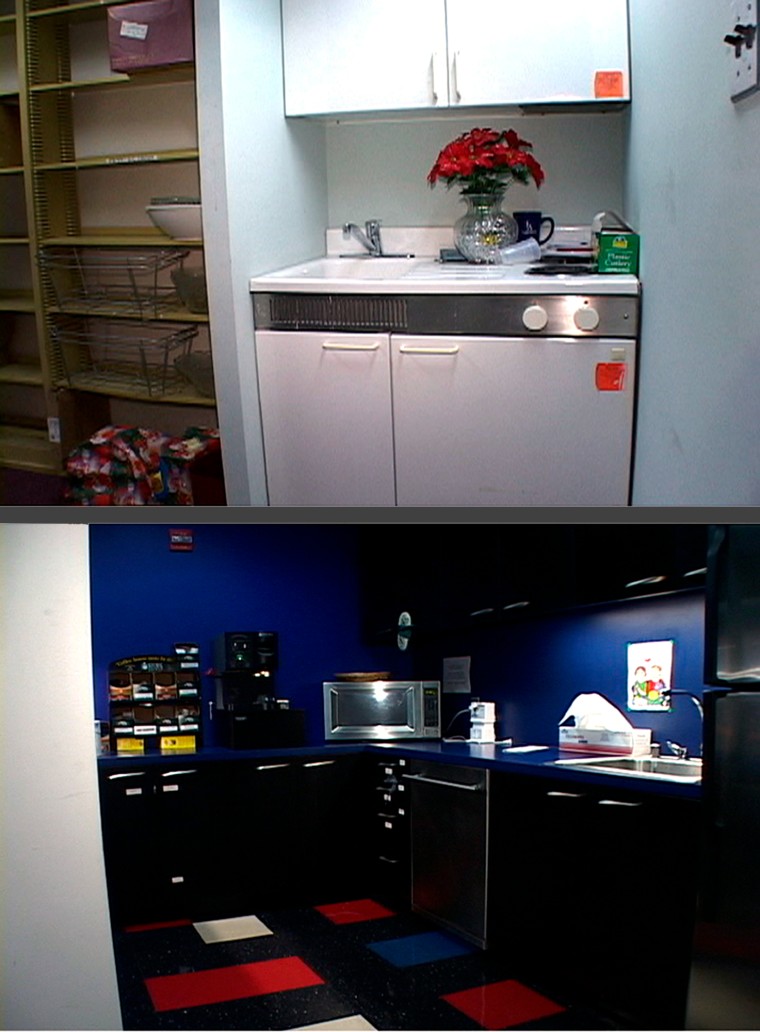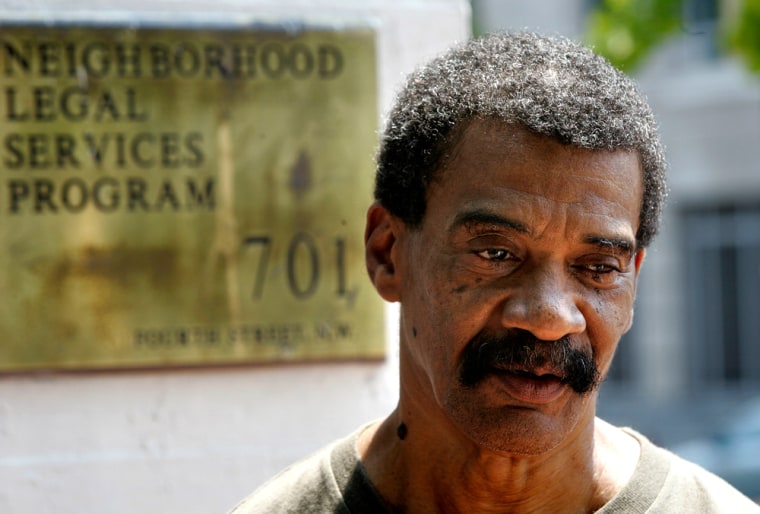The federal program that provides legal help to poor Americans turns away half of its applicants for lack of resources. But that hasn’t stopped its executives from lavishing expensive meals, chauffeur-driven cars and foreign trips on themselves.
Agency documents obtained by The Associated Press detail the luxuries that executives of the Legal Services Corp. have given themselves with federal money — from $14 “Death by Chocolate” desserts to $400 chauffeured rides to locations within cab distance of their offices.
The government-funded corporation also has a spacious headquarters in Washington’s tony Georgetown district — with views of the Potomac River and a rent significantly higher than other tenants in the same building.
And board members wrote themselves a policy that doubled the amount they could claim for meals compared with their staff.
The program’s clients were upset when told of the spending.
“I don’t think that’s right,” said Richard Taylor as he walked from an austere, carpet-stained Legal Services office in Washington, his head covered with a towel to protect himself from the searing heat on a recent summer day.
“They’re depriving some others that really need it and that’s not good. ... It’s supposed to be about the people.”
3 congressional panels question spending
Legal Services is a nonprofit corporation run with federal money that was created by Congress to provide legal help in civil matters for Americans who can’t afford their own lawyers. It funds neighborhood clinics across the country where lawyers provide such help.
Three congressional committees have questioned the program’s spending as has the corporation’s own internal watchdog. The chairman of the tax-writing Senate Finance Committee is threatening to withhold future money if the corporation doesn’t trim its extravagance.
“It’s waste and abuse,” said Sen. Charles Grassley, R-Iowa, citing the board’s doubling of the meal money as an example. “At 200 percent, it seems to me what we would call in Iowa living high off the hog.”
Legal Services officials defend their program, saying administrative expenses are kept separate from money distributed to the local, independently run legal outlets.
Corporation spokesman Tom Polgar said LSC president Helaine Barnett and board chairman Frank Strickland “are aware they are using taxpayer funds and try to operate in a manner that is frugal and appropriate.” Barnett is a former legal services attorney. Strickland is an Atlanta lawyer.
Barnett declined to be interviewed. Strickland did not return several phone messages seeking comment.
Corporation pleads poverty
The scrutiny of Legal Services’ spending comes as the corporation says it doesn’t have enough resources to meet many poor clients’ needs.
Legal Services’ own study found last October that for every client who receives service, one applicant is turned away for lack of resources. Since that study only counted those who contacted the program for assistance, the corporation said it likely underestimated the unmet need.
Nine recent state studies demonstrated that less than 20 percent of the legal needs of low-income Americans were being met, LSC said.
Library with bare walls
Neighborhood Legal Services, the local program that serves the poor in the nation’s capital, is a refuge where a federally funded lawyer can help a client stave off homelessness, fight an unscrupulous landlord, file for divorce or receive help with a host of other legal problems.
The lobby of the inner city office looks like a doctor’s waiting room that has used the same hardback chairs and magazine stand for decades. The carpet is worn and stained. Some offices are barely big enough for a desk.
Unlike Legal Services headquarters’ well-stocked library, filled with criminal code books and Supreme Court opinions, the local program library has mostly bare walls. The conference table doubles as a staff lunchroom.
Marie Parran of Washington, a legal services client, wants money supporting Legal Services headquarters to go instead to the field. “There’s so many poor people in the Washington, D.C. area who need the help and can’t afford a lawyer. I think that’s money that should be going to the poor that live in D.C,” she said.
Watchdog has doubts on spending
Legal Services own internal watchdog, Inspector General Kirt West, has questioned whether the corporation’s headquarters has more space than it needs and whether it pays too much for rent.
The headquarters has multiple conference rooms and kitchen/pantry areas. Yet, the corporation’s 11-member board of directors holds its meetings at hotels around the country, including Washington, at costs ranging from $20,145 to $55,125 — the latter in San Juan, P.R.
The decision not to use the headquarters conference room was explained in an October 2004 memo from board chairman Strickland. He said board members, who work outside the corporation, preferred the Melrose Hotel in the same upscale neighborhood as the headquarters.
The board members sought “convenience to their rooms” and did not want to “feel confined” to headquarters for two entire days, he said. In addition, he said he was worried that the headquarters lacked privacy because “all meeting rooms at LSC have glass walls.”
Lavish room-service meals
Bills from the Melrose, with all costs per person, included: a $59 three-entree buffet, an $18 breakfast featuring scrambled eggs with chives, a $17 breakfast including Belgian waffles, a $28 deli buffet, a $13 “high tea” service, a $12 “bagel break,” a $12 “Crazy for Cookies” assortment and $14 “Death By Chocolate” desserts.

Legal Services spokesman Polgar and Charles Jeffress, the LSC chief administrative officer, said the headquarters conference room can hold about 80 people, but that was too small to accommodate the 11-member board, the staff, the media and the public.
They also contended that meal costs for board members may be just as expensive if catered at headquarters.
Beyond the hotel-prepared meals at their meetings, it made sense for board members to dine together. The board fashioned for itself an expense policy that permitted members to receive up to 200 percent of the allowable meal expense — as long as board members ate together.
“The only time it was ever used was in conjunction with a board meeting,” Jeffress said.
The policy recently was rescinded after congressional investigators questioned it.
Barnett, Strickland and another board member have used limousine services.
Limo rides for short distances
Strickland had a packed schedule last April 25, so the agency ordered a car and driver to take him and Barnett to meetings on Capitol Hill with lawmakers — about a 15-minute ride from headquarters. The car also took them to Arlington National Cemetery for a funeral and to a separate memorial service, also in Arlington — all short rides.
Even the Legal Services Corp. comptroller, David Richardson, questioned the expense.
“With cab fares from our office to Capitol Hill costing $20 and the nominal cost of a cab to Arlington Cemetery and return, this $423.99 seems to be an extraordinary cost,” he wrote in an internal memo.
Polgar, who acknowledged making the decision to hire the car, said he was concerned that Strickland wouldn’t make his schedule.
Barnett also used a hired car and driver to attend a funeral service for a former board member in Harrisburg, Pa., about a two-hour drive. The cost: $400.
Polgar said Barnett, who does not have a car in Washington, wanted to work on the trip rather than rent a car and drive herself. The cost was competitive with train fare and airlines, he said.
A trip to Ireland
Barnett and Strickland both attended the International Legal Aid Group Conference in Killarney, Ireland in June 2005. To get to Killarney from Shannon Airport, Barnett took a cab for $220 and returned to the airport by taxi for $189, a cost of $409 for a roundtrip of about 160 miles.
Polgar said Barnett was supposed to have a free ride from Shannon, but she was stranded at the airport and had to take the cab. She couldn’t find a ride for the return trip, he said.
The Legal Services headquarters in Georgetown was bought by a nonprofit group, Friends of the Legal Services Corp., that was formed to purchase a permanent headquarters.
The board chairman, Thomas Smegal, said the $38 per-square-foot rent charged Legal Services was a good deal — even though other tenants were paying less than $30. Nonetheless, he said Legal Services was not getting ripped off.
Smegal said LSC’s rent won’t change for the 10-year lease, while other tenants’ rents rise. The tenants paying low rent already had those leases when Friends took over the building, said Smegal, a San Francisco lawyer.
When the building is paid off, he said, it will be turned over debt-free to the Legal Services Corp.
